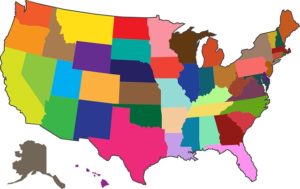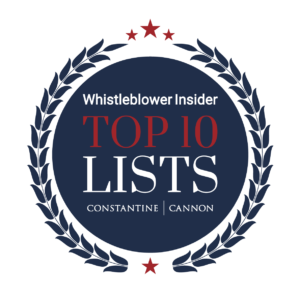Top Ten State Fraud Recoveries of 2022

State and local governments play a critical role in ensuring that businesses and individuals are held accountable if they commit healthcare fraud, financial fraud, government contract fraud, and more. For whistleblowers, state governments can offer additional opportunities to report wrongdoing.
Where government funds are at stake – and state and local government spending reaching $3 trillion annually – more than 30 states have False Claims Acts that are modeled after the federal False Claims Act. Whistleblowers with information about healthcare fraud are often involved in state enforcement efforts, whether because state Medicaid dollars are at stake, or in states that offer rewards for whistleblowers reporting fraud against private insurance companies.
State enforcement often goes hand-in-hand with federal enforcement, whether in cases involving Medicaid, government purchasing, or even financial regulation. Notably, the SEC, CFTC, and AML Whistleblower Reward programs recognize recoveries by state authorities as “related actions,” potentially entitling whistleblowers to a share of state recoveries.
In addition to combined federal-state actions, states may join forces to bring coordinated actions against a defendant. Such coordinated state enforcement played a significant role this past year, notably in consumer fraud cases otherwise omitted from this whistleblower-focused list. Such coordinated multi-state consumer fraud recoveries include a settlement valued at $1.85 billion between 29 states and Navient, f/k/a Sallie Mae; a $438.5 million settlement by JUUL Labs with 34 states and territories; a $392 million settlement by Google; and, a $141 million settlement by Intuit.
The state enforcement actions on our Top Ten list below represent significant achievements and recoveries for taxpayers and states in cases of interest to whistleblowers. For whistleblowers in healthcare, government procurement, finance, and other fields, it can be important to retain counsel experienced in working with state governments and on cases where different levels of government enforcement must be coordinated.
Our Top Ten State Healthcare and Financial Fraud Recoveries of 2022 are:
- Opioid Litigation – Multistate – over $20 billion. State and local entities continued their enforcement efforts against opioid manufacturers, distributors, and retailers. In settlements totaling $13.6 billion, retailers Walgreens, CVS, and Walmart agreed to a resolve claims by state, local, and tribal governments that they over-dispensed opioids without proper due diligence, ignored red flags, and failed to identify, report, and halt suspicious orders. The national settlement came after significant trial court victories against the retailers, including a jury award of $650 million against the three pharmacies for recklessly dispensing opioids in two Ohio counties, and a victory by the City of San Francisco in a liability trial against Walgreens. In addition, manufacturers Teva and Allergan reached multi-state agreements, agreeing to pay more than $7 billion in total. Several states reached their own settlements with manufacturers (including New York, Florida, and Texas) and distributors (including Washington).
- Credit Suisse RMBS Misrepresentations – New Jersey — $495 million. In one of New Jersey’s largest civil monetary recoveries ever, Credit Suisse entities agreed to pay a $100 million civil penalty plus $300 million in restitution to investors to settle the state’s lawsuit alleging that it misrepresented the risks of residential mortgage-backed securities (RMBS) in the years leading up to the 2008 financial crisis.
- Medi-Cal Adult Expansion Settlements – California – $93.2 million. This entry groups several settlements that involve different defendants in different actions initiated by different whistleblowers. However, the cases allege similar wrongdoing, and illustrate how state and federal authorities work together in cases involving Medicaid fraud. In these cases, the government alleged payors and providers had gamed the Medical Loss Ratio (MLR) rule, which dictates the percentage of public healthcare dollars that must be spent on certain medical expenses, as opposed to on things like administrative expenses. In August, Southern California’s Ventura County Organized Health System and several medical providers including Dignity Health agreed to pay over $70 million to resolve allegations that the system and its affiliates submitted false claims for “Additional Services” to Medicaid Expansion Program beneficiaries that were no allowed medical expenses, that were duplicative of services already required, and that weren’t reflective of fair market value. In December, Dignity Health and Tenet Healthcare agreed to pay over $22 million to settle similar allegations. The defendants, whose hospitals in San Luis Obispo County contracted with Medi-Cal, agreed to provide healthcare services to Expansion Program beneficiaries and return surplus funds if they did not spend at least 85% of the specified funds on eligible services. The government alleged that the hospitals falsely billed for “Enhanced Services,” which allowed them to overstate AE spending.
- Centene Corp. – Oregon, Washington, New Mexico, New Hampshire – $70.85 million. Appearing on this list for a second year, the pharmacy benefit manager resolved claims by multiple states that it overbilled the states’ Medicaid programs in its management of those states’ Medicaid prescription drug programs. The states’ allegations against Centene included claims that the PBM failed to provide required discounts, inflated dispensing fees, and inaccurately reported costs.
- BlockFi Lending – Multistate — $50 million. Working with the SEC, state securities regulators investigated the cryptocurrency company for the sale of unregistered securities to retail investors in the form of its BlockFi interest accounts. As we have previously written, the government alleged that the accounts, through which investors lent crypto assets to the company in exchange for BlockFi’s promise to repay with variable monthly interest, met the definition of a security. As part of the settlement, BlockFi agreed to stop offering the BIAs to the public, pay a $50 million penalty the SEC, and a $50 million penalty to be shared among the 53 U.S. jurisdictions that are members of North American Securities Administrators Association (NASAA). The settlement illustrates the important role state securities regulators can play, and NASAA has been a leader in recognizing the importance of whistleblowers in uncovering financial fraud.
- H&M – New York — $36 million. In a recovery showing the reach of state False Claims Acts, fashion retailer H&M paid to resolve claims brought by a whistleblower alleging that the company improperly retained unused balances on gift cards. In NY, unused gift cards do not just die an unmarked death in the bottom of the kitchen junk drawer. Instead, state law requires gift card issuers to turn over unused balances to the state’s Office of Unclaimed Funds after five years of inactivity. The state and a whistleblower alleged that H&M knew about this law, and claimed to have outsourced its gift card operations to an out-of-state company, relieving itself of its NY obligations. This was not true; H&M continued to run its own gift card business. The whistleblower will receive $7.74 million for bringing H&M’s misconduct to light.
- National Bank of Pakistan – New York – $35 million. Following a coordinated investigation by the New York Department of Financial Services and the Federal Reserve Bank of New York, the National Bank of Pakistan agreed to pay $35 million in penalties to the state, and an additional $20.4 million in penalties to the Federal Reserve. The state found that the bank’s New York branch failed to maintain an adequate AML compliance program, despite earlier warnings by regulators, which resulted in an earlier compliance agreement with the state.
- Essilor – California – $23.8 million. In a whistleblower action brought under California’s Insurance Frauds Prevention Act, the optical lens and eyewear manufacturer was alleged to have provided kickbacks and other unlawful incentives to eye care providers that ultimately hurt consumers – and their insurers – by driving them toward more expensive services. The kickbacks took the form of upfront cash payments in exchange for the providers’ promises to send business to Essilor, and additional cash payments that rewarded providers who prescribed and dispensed Essilor’s more expensive lenses and coatings and used its laboratory services. Whistleblower Christie Rudolph received an IFPA whistleblower reward of approximately $11.1 million. Earlier in the year, Essilor resolved similar claims under the federal False Claims Act, paying $22 million.
- Academy Bus – New Jersey — $20.5 million. New Jersey intervened in a whistleblower action brought by a former employee of Academy Bus alleging that the company cheated on its contract with New Jersey Transit by underreporting missed bus trips – tens of thousands of missed trips over six years – and by over-billing for hours and miles driven. The settlement, which represents the State’s largest-ever False Claims Act settlement outside the healthcare sector, requires Academy to implement specific compliance procedures, and calls for named corporate affiliates and individual corporate officers to contribute to the settlement payment.
- Reddy’s – Texas — $12.9 million. Pharma manufacturer Dr. Reddy’s agreed to pay Texas to resolve allegations that the company reported inflated drug prices to the Texas Medicaid program, resulting in the state overpaying for the drugs.

Annual Whistleblower Insider Top Ten Lists
Every January, Whistleblower Insider looks back at the significant government enforcement actions of the past year. Our Top Ten lists highlight the biggest recoveries and significant enforcement efforts by different government actors in cases of interest to whistleblowers.
Browse Top 10 Lists
Read More:
- State and Local False Claims Acts
- State Enforcement Actions
- The Constantine Cannon Whistleblower Team
- Contact us for a Confidential Communication
Tagged in: FCA State, Financial and Investment Fraud, Government Procurement Fraud, Healthcare Fraud, Housing and Mortgage Fraud, Medicaid, Money Laundering, Private Insurance Whistleblower Reward Programs, Top 10,